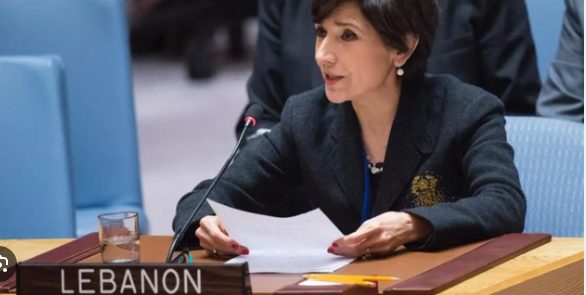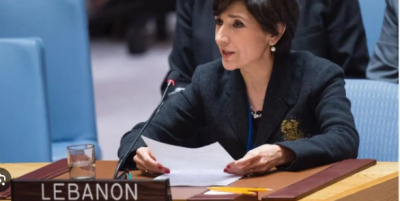Former Lebanese Ambassador to the United Nations, Amal Modelly, responded in a statement to "the article published by the newspaper 'Al-Akhbar' which claimed, citing U.S. envoy Amos Hochstein, that I am responsible for the issuance of Security Council Resolution 2650, which renewed UNIFIL last year, that included language about the freedom of movement for UNIFIL without prior permission, a stance that Lebanon rejects. In fact, I did not respond last year to the accusations when I received information from Lebanon that Foreign Minister Mr. Abdallah Bou Habib had placed the responsibility on me before the Foreign Affairs Committee and before Lebanese parties directly concerned with the situation in the south for passing the resolution with the new phrasing. I did not wish to, nor do I want to involve the Foreign Ministry in a political tempest that would add to the difficult situation the ministry and Lebanon are facing. I believed that no one could be credibly believed to think that an ambassador alone, without the support of their state, could change a decision of the Security Council involving major nations. Unfortunately, this happened even after the minister's visit to the United Nations this week and the issuance of the resolution without changes to last year's phrasing."
She added: "However, today, after I was informed that the Foreign Minister accused me before the Security Council members of being responsible and that I had not implemented the Lebanese state's instructions last year, and claimed that I was dismissed from my position because of that, which is untrue, I found it necessary to present the facts to everyone so that the truth of what happened could be revealed and the attempts to mislead public opinion and the international community regarding responsibility for the failure to bear political responsibility last year, which led to the issuance of the resolution, do not continue."
She continued, "On August 9th of last year, we received in the Lebanese mission at the UN from the French a draft resolution text that France usually prepares since it is the penholder for Lebanon in the Security Council. I, along with the diplomat tasked with the UNIFIL file at the mission, reviewed it and sent a report to the Foreign Ministry about it and requested instructions so we could begin negotiations because the Lebanese ambassador to the UN, like all diplomatic representatives of countries, cannot negotiate with the Security Council without detailed and precise instructions from their state. Weeks passed without any response or instructions from the Foreign Ministry. I contacted the Foreign Minister dozens of times and sent messages asking for the instructions as time was pressing and we did not have Lebanon's position regarding the text. The Minister's response each time was that he was waiting for instructions and comments from the Ministry of Defense on the proposed resolution and had not received them yet."
She stated: "In all the communications I had with the minister and in our discussions, he never once mentioned the issue of UNIFIL's freedom of movement or suggested an alternative language. The minister's concern was consistently focused on the necessity of maintaining the section related to UNIFIL's assistance to the Lebanese Army in the south, which was suffering from shortages of fuel and food. The minister's documented concern in messages indicated to us that this was his priority, and we began working to convince China, which opposed extending assistance to the Lebanese Army as it considered it a temporary measure. The difficult negotiations I led with the Chinese ambassador and Security Council members led to our success in maintaining assistance for the Lebanese Army."
She added, "As the voting date approached, our concern increased over the lack of instructions and I intensified my contacts with the minister, but to no avail. I reached out to the Director of Political Affairs at the Foreign Ministry and requested his assistance, but he was on annual leave and unable to help. The instructions finally arrived on August 29th, although the vote was scheduled for August 30th. We immediately contacted Security Council members and provided them with Lebanon's position on the proposed amendments and I began my communications with ambassadors to present our stance. The response was always that you have been very late, and we want time to consult with our capitals. We requested a postponement of the vote, which was indeed postponed until August 31st so we could conduct further communications. Any diplomat knows how complex and difficult negotiations at the Security Council are, and the minister discovered that this week; negotiations do not only occur in New York by the missions of countries but also between capitals where officials communicate with each other to secure the necessary support. To evade responsibility and to place the blame solely on the ambassador for passing a decision from Security Council nations is slander and a serious matter because it tarnishes the reputation of an ambassador who performed her duties professionally and puts her in the dock of accusation."
She concluded: "The messages and communications I had are documented, especially my message to the minister on August 29th after receiving the instructions, informing him that we had distributed Lebanon's position to the Security Council members, and I said, 'But you know this is very late. The proposed language is usually sent a month in advance for negotiation, but we are doing our best.' The minister's response was simply 'thank you.' Additionally, all my communications with the Foreign Minister and our correspondence with the ministry are documented, and I retain my right to defend myself against a campaign that seeks to place responsibility on me for something that resulted from the minister's and the Foreign Ministry's negligence and not from my neglect of my work. I will no longer accept the continuation of slander against me, as the blame should be directed toward those who failed to bear responsibility. I hope the minister will reflect and hold himself accountable instead of casting blame on others. I will also not accept any damage to my professional reputation in front of the Security Council members with whom I have worked and who know that I represented Lebanon faithfully and at the highest standard in the UN, elevating its name through all I did in the most difficult circumstances Lebanon has faced in its history."




